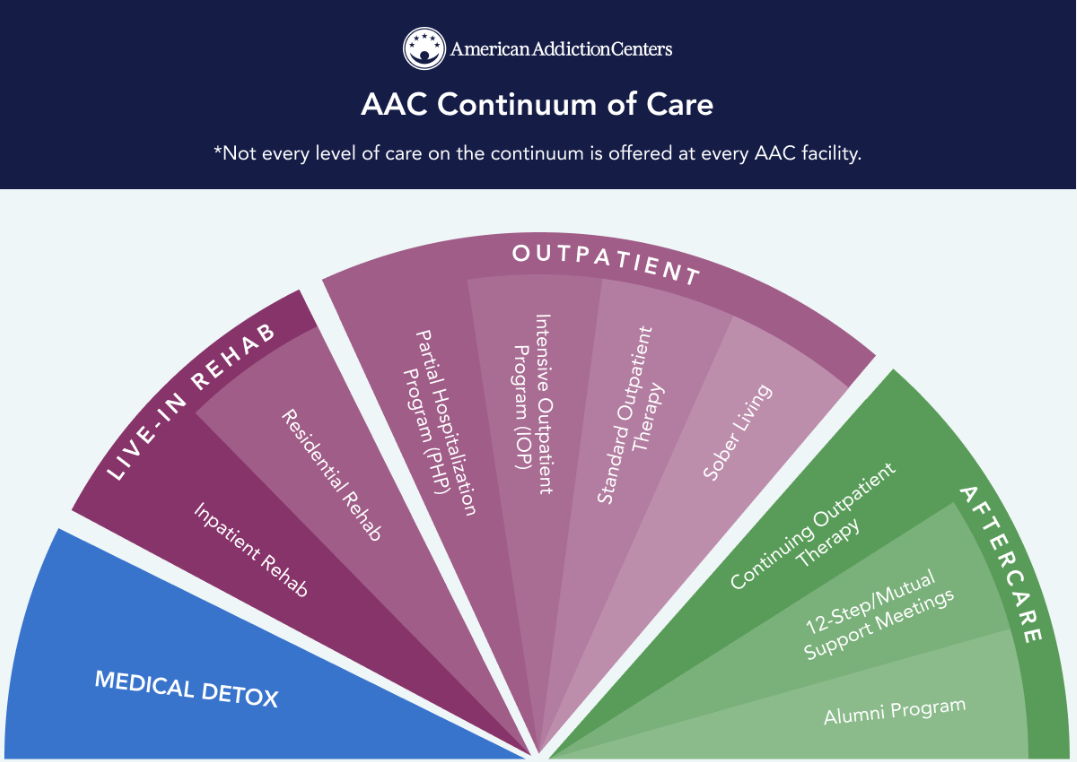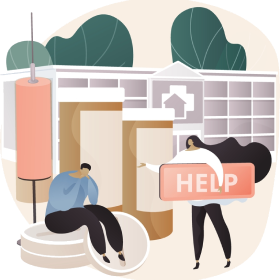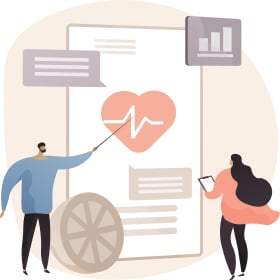
Choosing the Right Rehab Program Email Sample
Rehab Vocabulary

There are a variety of drug rehab programs available and the type one might need will depend on their individualized needs. The following are some common rehab terms that you or a loved one may encounter when researching rehab programs:
- Substance use disorder or addiction: A Substance Use Disorder (SUD) is a medical condition that is defined by the inability to control the use of a particular substance (or substances) despite harmful consequences. In other words, SUDs occur when an individual compulsively misuses drugs or alcohol and continues abusing the substance despite knowing the negative impact it has on their life.
- Detoxification or detox: A medically managed detox program will help stabilize the patient and help them overcome the symptoms of withdrawal from drugs or alcohol. These programs may last a few days to weeks. Once stabilization is achieved, the patient may need an inpatient program.
- Inpatient/Residential Rehab: Inpatient and residential rehab programs are live-in solutions where patients will receive supervised treatment and structured care plans to overcome their addiction. These programs may last anywhere from a few weeks to a number of months, and may be followed by outpatient rehab. Depending on the program, patients may receive 24/7 monitoring from a licensed professional.
- Outpatient Rehab & Intensive Outpatient Programs (IOP): Outpatient programs allow users to attend therapy and receive treatment on their own time as patients do not need to be on-site or live at the facility. Treatment may occur at a substance abuse treatment center, community health clinic, hospital-affiliated clinic, or other facility, meeting on a regular basis. Some outpatient programs may even offer night and weekend programs which make them a favorite for those personal, family, and/or professional responsibilities that may prevent them from attending an inpatient rehab.
- Medication Assisted Treatment or MAT: MAT combines pharmacological treatment (medications) with behavioral treatment that is tailored to a patient’s unique needs. This combination has proven effective for the comprehensive treatment of certain substance use disorders. It allows for the simultaneous pharmacological management of some of the physical symptoms associated with substance use (or substance withdrawal), as well as behavioral therapeutic interventions for related psychological, mental, and emotional issues.
- Co-occurring disorder or dual diagnosis: When a person meets the criteria for a substance use disorder (SUD), a medical condition defined by uncontrollable use of substances despite the negative consequences, and they are also diagnosed with one or more additional mental disorders, this is called having co-occurring disorders or a dual diagnosis. Some rehab programs have specialized ways of handling those with co-occurring disorders.
Our Continuum of Care
American Addiction Centers (AAC), a network of nationwide rehab facilities, offers the full-continuum of care for individuals dealing with addiction. Everyone’s needs are different and so one might need just one part of the continuum or all parts. Call us at to learn more about which program is best for your situation.

Things to Look for in a Rehab Program

The following are just some of the things to look for when determining which rehab center is right for you or your loved one:
- Accreditation and Licensing: Ensure that the rehab center is accredited by relevant organizations and licensed by the appropriate government agencies. This indicates adherence to quality standards and regulations.
- Treatment Approaches: Different rehab centers may offer various treatment approaches, such as cognitive-behavioral therapy, 12-step programs, holistic therapies, or dual-diagnosis treatment. Choose a center that aligns with your or your loved one’s preferences and needs.
- Medical Staff and Expertise: Look for a rehab center with experienced medical professionals, therapists, and addiction specialists who are trained to provide comprehensive care tailored to individual needs.
- Customized Treatment Plans: Effective rehab centers create personalized treatment plans based on each person’s unique circumstances, including the severity of addiction, mental health status, and any co-occurring disorders.
- Facility Amenities and Environment: The facility’s environment can impact the recovery experience. Consider factors like location, facilities, cleanliness, and overall atmosphere to ensure it promotes healing and comfort.
- Duration of Treatment: Different rehab centers offer varying lengths of treatment programs, such as 28-day, 60-day, or 90-day programs. Choose a duration that aligns with the severity of the addiction and the individual’s progress.
- Aftercare and Relapse Prevention: A comprehensive rehab program should include aftercare services, such as ongoing therapy, support groups, and relapse prevention strategies, to help individuals maintain their sobriety after leaving the center.
- Family Involvement: Family support can play a significant role in the recovery process. Look for a rehab center that involves family members in therapy sessions or provides family education and counseling.
- Cost and Insurance Coverage: Understand the costs associated with the rehab program and inquire about insurance coverage. Many centers accept insurance, and some even offer financial assistance or payment plans.
- Success Rates and Reviews: While success rates can be difficult to measure, reading reviews and testimonials from former patients and their families can provide insights into the rehab center’s reputation and the experiences of others.
When is Rehab Right for You?

The following are some signs that rehab may be right for you:
- Loss of Control: You find it increasingly difficult to control your substance use, often consuming larger amounts or using for longer periods than intended.
- Failed Attempts to Quit: Despite multiple attempts to quit or cut back on your substance use, you consistently relapse or are unable to maintain sobriety on your own.
- Neglected Responsibilities: Your substance use is causing you to neglect important responsibilities at work, school, or home, leading to problems with relationships, performance, and obligations.
- Health Issues: Your physical or mental health is deteriorating due to substance abuse, and you’re experiencing negative consequences such as frequent illness, mood swings, or memory problems.
- Cravings and Obsession: You often experience strong cravings for the substance, and thoughts about obtaining and using it occupy a significant portion of your time and mental space.
- Isolation and Withdrawal: You’re withdrawing from social activities and relationships you once enjoyed, preferring to be alone or only in the company of others who also use substances.
- Legal Problems: Your substance use has led to legal issues such as arrests, DUIs, or other legal consequences, indicating that your behavior is impacting your legal standing.
- Financial Strain: You’re spending an excessive amount of money on obtaining substances, leading to financial difficulties and even resorting to borrowing or stealing.
- Tolerance: You’ve developed a tolerance to the substance, needing higher doses to achieve the same effects, which can be a sign of a progressing addiction.
- Risk of Harm: Your substance use has put you or others in dangerous situations, such as driving under the influence, engaging in risky behaviors, or experiencing accidents related to substance use.
Did you find this email useful? If so click here.